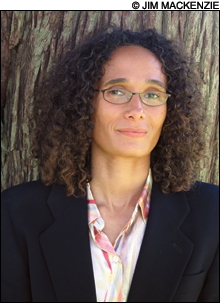
ROSE ON . . . Lil Wayne (“rapping about the same three subjects”) |
Some 40 years in, rap is nothing less than a cultural juggernaut. But it has not lost its power to provoke.
Brown University's Tricia Rose, one of the nation's most prominent hip-hop scholars, has taken apart some of the most facile critiques of the music: rap is destroying American values, rap is responsible for urban violence.
But she is also a provocative critic of hip-hop's trajectory. The form, she insists, is in a state of crisis: cheapened, corporatized, given to a narrow and too often vile depiction of black American life.
It may be time, she suggests, for an entirely new form.
The Phoenix caught up with her recently for a Q&A — mostly by phone, with a couple of follow-up questions via e-mail. The interview is edited and condensed for length.

WARNING SIGNS “Hip-hop is like the miner’s canary for us. It’s telling us, look, we are not well.” |
YOU OPEN YOUR BOOK,HIP-HOP WARS, WITH THE DECLARATION "HIP-HOP IS NOT DEAD, BUT IT IS GRAVELY ILL." I was engaging an ongoing debate that some artists and writers have been raising about the question of what's happened to hip-hop through its increasing popularity and its increasing commercialization. "Hip-hop is dead" is a Nas reference, but he's not the only one. A lot of people have been debating it.Part of that quote was intended to make clear where I stood on that take. Why I said "gravely ill" and not "dead" is really, honestly, more about my faith in human creativity and the power of people once they make a decision to act in collective and progressive and meaningful ways. That power is profound and mostly untapped right now in relationship to hip-hop. So when I said "gravely ill" it actually spoke less to what I thought was going on in hip-hop at the moment — as if there was some secret underground that was going to rescue it — but more about the fact that I know, once properly envisioned, such a space could completely transform where we are.
WHEN YOU SAY "TRANSFORM WHERE WE ARE," WHAT DO YOU MEAN BY THAT? Well, we're at a level of crisis about what the point of art is, what the point of creativity is. In many ways I think the cultural arena is in the same kind of crisis as the food chain, where we are eating foods that mostly make us sick and mostly make us obese. And there's pretty much no conversation about it. And that food supply is controlled by conglomerates whose primary goal is profit and that's pretty much what our cultural arena is like. And so we have a situation where people's natural healing capacities, people's natural creativities, people's extraordinarily ability to make things new is being channeled and stifled and narrowed into the most simple-minded products for profit.
Now why this matters for hip-hop is because it trades very clearly — the commercially dominated hip-hop that is most of hip-hop today — trades with impunity on the most obvious and vicious, presumptuous stereotypes about black people that we've ever created — for the profit of record-selling and for image-conjuring. It is stunning to me that we cannot see it well enough to be uninterested in it or that we're just so OK with it — that we just like to buy it.